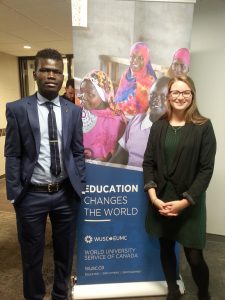Carleton University celebrates 40 years of student refugee sponsorship

David Kenyi (left) and Caroyln McKee (right) are pictured at WUSC Student Refugee Program’s 40th anniversary. McKee is the program officer for the student refugee program and Kenyi is a recent Carleton grad and program beneficiary.
A program that has enabled refugees from around the globe study at Carleton University has come a long way since the first refugee from Zambia was admitted in 1978.
The Carleton program, which celebrated four decades of sponsorship Friday, is part of a wider Canadian initiative of the World University Service of Canada (WUSC) that allows asylum seekers from conflict zones to pursue post-secondary education at Canadian universities and colleges.
To date, campuses across Canada have accepted 1,900 refugees from 39 countries.
One of those was David Kenyi, who is originally from South Sudan and came to Canada through the program. He graduated from Carleton last June with a degree in math and statistics.
“My cousins also came through the program,” he said, referencing how he had first heard about it. “We knew a lot of people over the years who had come to Canada through the program.”
Kenyi said he can’t speak for what it’s like to be a refugee in Canada though, as the program automatically grants students permanent residency while pursuing their studies.
“When we come to Canada through the SRP we are told you are not a refugee anymore,” he explained.
The first refugee in 1978 was the only one to arrive that year. It was made possible by a change to the Immigration and Refugee Protection Act that recognized refugees as a distinct class of immigrant, and allowed Canadian citizens to privately sponsor refugees for the first time.
Canada was increasingly exposed to global conflict in the seventies. Between 1970 and 1990, Canada re-settled 20,000 Soviet Jews fleeing religious and political persecution. Most notable was Canada’s acceptance of 60,000 refugees fleeing the Vietnam War after the Communist victory between 1979 and 1980.
In 2016, Canada saw its second largest influx of refugees, accepting more than 46,000 refugees fleeing from the Syrian Civil War.
“When I look at some of my friends that didn’t get the chance to come here,” Kenyi said, “based on what I know of them, it is difficult for them to go to school.”
“Back in Sudan I was in a refugee camp and so if I wasn’t here I’d probably still be in that refugee camp,” he continued.
According to Carolyn McKee, who is WUSC’s program officer for the Student Refugee Program, each student is funded by a local committee on campus made up of students and faculty that raises money to provide refugees full financial and social support.
“I think for us, success is really enabling students to complete their education and to build strong livelihoods for themselves and their families,” McKee explained. She said that there are quite a few alumni in the area, many of which are pursuing jobs in the nursing and the government, and some are pursuing further studies.
